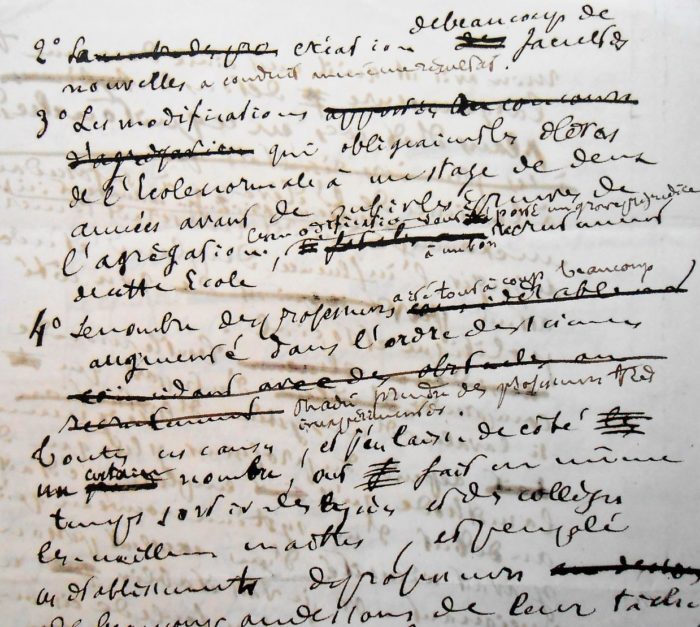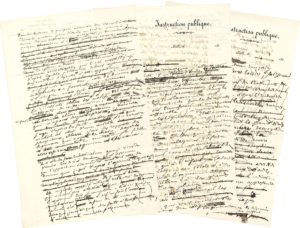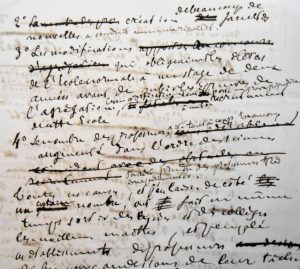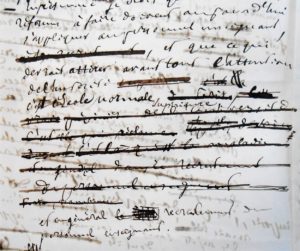Louis Pasteur (1822-1895). [Address to the Academic Council of the North as the first Dean of the new Faculty of Sciences of Lille, on the reform of secondary education]. Autograph draft, Lille [between 1855 and 1857] ; 7 pp. ½ in-8°, with letterhead “Instruction publique”. Académie de Douai. Faculté des Sciences de Lille ».
Address unpublished to our knowledge, very critical about the “bifurcation”, reform of secondary education imposed by the Fortoul Ministry on 1852 to ensure a new place for science in high schools while renovating teaching methods. Text of a striking topicality in which Pasteur criticizes the lack of consideration for the student, early specialization, teacher training, the duration of the studies, their required versatility and their reduced remuneration, poor faculty recruitment, etc. In 1854, the scientist had been appointed professor of chemistry and dean of the new Faculty of Sciences of the University of Lille, where he began his studies on fermentation. It was during the speech delivered in Douai on 7 December 1854 on the occasion of the solemn installation of the Faculty of Letters of Douai and the Faculty of Sciences of Lille, that he made his oft-quoted remark : “in the fields of observation, chance favors only prepared minds”, of which our text is an extension : ” as much is worth the master as much as worth the method whatever it is elsewhere […] I believe that the real reforms to be made today must apply to teachers”.
The Scientist, judging solely on their own experience, presents several observations on this new study’s plan. In the first place, he criticizes the lack of consideration for the student and his early specialization : “in the middle of a century that scientific discoveries have transformed and will mark an indelible sign in the following ages, I find it hard to believe that the legislators of the new study’s plan, under the inspiration of a great politician, had in view only more or less advanced science of the student who leaves the benches of the college and his relative strength in an examination. They were probably thinking about more to man than to the child, to society than to college, to the century and its tendencies than to the examination. These are the main results of a plan. of studies. But those, who would dare to judge them according to a test that still sees on the benches of the college the generation that chance took as the subject of the experiment. “
Then he critizes the training of teachers, he fears that we care more about “ the method and not enough of the man who applies it ” recalling in passing “ the excellence of the results obtained wherever the professant was learned and skilful[…] as much is worth the master as much as worth the method whatever it is elsewhere “. He insists on the fact that “it would be foolhardy to judge the influence of the current study’s plan by its political and social side ” and focuses on the indispensable excellence of the teaching staff in order to enhance this new education system. However, he deplores “that the value of teachers has declined significantly since the implementation of the study’s plan” and gives the causes :
the impoverishment of the number of “distinguished professors ” due to the creation of departmental academies and many new faculties, the introduction of a two-year internship prior to the aggregation tests and the recruitment of inexperienced science teachers due to the increase in recruitment. “All these causes, and I leave some aside a number, at the same time, brought out of high schools and colleges the best teachers, and appointed in institutions professors far below their task, not by zeal, probably, but by the science and experience of the professorship. “
He notes the strong demands associated with wage cuts despite the increase in the cost of living and the attractiveness of the industrial world.! While teachers were required, for these new studies, pedagogical versatility “for the needs of the service and the results of the reforms […] , most of the masters’ treatments were diminished although the increase in price won all things and that the industry was there to seduce new recruits. “
Finally, he criticises the rigidity of the programmes and again insists on the early specialisation of teachers. : “But what is the point of indicating subjects without the in-depth knowledge of the science of which they treat. How to choose when you do not have the taste formed.
Who doesn’t know that the summaries [scholars delete] that the new programs suppose, want masters more skillful than the complete and necessary exposition of facts and theories. Hence these stopped programs imposed, down to the smallest details. »
In conclusion, he believes that the real reforms to be made today must apply to the recruitment of teaching staff, in particular concerning the École normale supérieure, “that is increasingly demanding urgent care. This is where the disease is “.
The “bifurcation” was a failure, due in part to the inconveniences that Pasteur criticizes. It was abolished in 1864 by Victor Duruy. See N. Hulin. A propos de l’enseignement scientifique : une réforme de l’enseignement secondaire sous le Second Empire : la « bifurcation » (1852-1864). In : Revue d’histoire des sciences, tome 35, n°3, 1982. pp. 217-245.
Full text on request.
5 500 €





